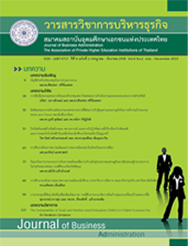The Sustainability of Small and Medium-sized Enterprises (SMEs) in A Digital Economy Era
Keywords:
Sustainability, Small and Medium-sized Enterprises (SMEs), Digital Economy, ความยั่งยืน, วิสาหกิจขนาดกลางและขนาดย่อม, เศรษฐกิจดิจิตอลAbstract
In an economic downturn, the adoption of digital economy and utilization of Information Technology with Small and Medium-sized Enterprise (SMEs) seem to be increasingly important and becoming a new foundation for entrepreneurs today.These are believed to offer a number of advantages regarding the effi ciency, effectiveness, and innovation across the business functions which can lead to more productivities and new opportunities in the market. This will directly induce a great number of new entrepreneurs in the market, removing market barriers and enhance the competitive advantages especially from the SMEs sector - the backbone of the economy in most countries. However, it is not a straightforward task. On one hand, myriads of new entrepreneurs are enjoying the new opportunities that their older generations never had and at the same time their customers are also adjusting their consumption behavior from the old ways to the digital ways very well. On the other hand, researches have found that most SMEs still face the problems in relation to how they can digitize their business structures and functions such as fi nance, marketing and human resources and above all international cooperation. Therefore, this paper aims to highlight key success factors and provide a guideline for SMEs how to start successfully in the key emerging markets as well as introduce key sustainability factors in a digital economy era. The fi ndings of this research should prove valuable to any size of businesses and create a greater awareness of the advantages of the digital economy and business sustainability of SMEs. In sum, it was shown that SME entrepreneurs had to carefully consider the relevant organizational and individual factors as well as the degree of innovation adoption in the organization in order to warrant their business successes in this post-modern business era, the digital economy.
ความยั่งยืนอยู่ของธุรกิจขนาดกลางและขนาดย่อมในยุคเศรษฐกิจดิจิตอล
ในสถานการณ์เศรษฐกิจที่ถดถอย แนวคิดในการนำระบบเทคโนโลยีสารสนเทศมาใช้ในกระบวนการทางธุรกิจ ในวิสาหกิจขนาดกลางและขนาดย่อม(SMEs)กลายเป็นเรื่องสำคัญและเป็นปัจจัยพื้นฐานใหม่สำหรับการลงทุนของผู้ประกอบการในยุคปัจจุบัน เช่นเดียวกับแนวคิดการบริหารเวลาอย่างมีประสิทธิภาพและการเป็นมิตรต่อสิ่งแวดล้อมและสังคม โดยแนวคิดในการประยุกต์ใช้ระบบเทคโนโลยีสารสนเทศในเศรษฐกิจดิจิตอลของผู้ประกอบการ เชื่อได้ว่าจะนำมาสู่ประโยชน์ในการต่างๆเช่นการเพิ่มขึ้นของประสิทธิภาพ ประสิทธิผล นวัตกรรม และโอกาสในการเข้าสู่ตลาดใหม่ นอกจากนี้ยังจะเป็นการเพิ่มจำนวนผู้ประกอบการใหม่ในตลาด สามารถกำจัดสิ่งกีดขวางในการเข้าสู่ตลาด และเพิ่มศักยภาพทางการแข่งขันโดยเฉพาะอย่างยิ่งในวิสาหกิจขนาดกลางและขนาดย่อม ซึ่งเป็นตัวขับเคลื่อนเศรษฐกิจหลักของนานาประเทศ อย่างไรก็ตามการเปลี่ยนแปลงวิถีเดิมในการประกอบธุรกิจไม่ใช่เรื่องง่ายและยังเป็นงานที่สลับ ซับซ้อน แต่ก็ยังมีผู้ประกอบการรายใหม่จำนวนมากที่สามารถใช้ประโยชน์และโอกาสใหม่ของเศรษฐกิจดิจิตอลนี้ ซึ่งไม่มีสำหรับผู้ประกอบการในยุคก่อน ในขณะเดียวกันกับการเปลี่ยนแปลงพฤติกรรมของผู้บริโภคในทางที่สนับสนุนการดำเนินธุรกิจดิจิตอล แต่ทว่ามีงานวิจัยจำนวนมากได้พบว่าวิสาหกิจขนาดกลางและขนาดย่อมยังประสบปัญหาจากการนำเทคโนโลยีสารสนเทศมาใช้ในกระบวนการทางธุรกิจ ด้วยเหตุผลนี้ งานวิชาการชิ้นนี้ผู้เขียนมุ่งที่จะแสดงให้เห็นถึงปัจจัยที่มีความสำคัญต่อความยั่งยืนของวิสาหกิจขนาดกลางและขนาดย่อมในยุคเศรษฐกิจดิจิตอลรวมถึงความสามารถในนำปัจจัยเหล่านี้ไปประยุกต์ใช้ในธุรกิจต่างประเภท และสร้างความตระหนักถึงความสำคัญของการนำเทคเทคโนโลยีสารสนเทศมาใช้ในกระบวนการทางธุรกิจ โดยงานวิชาการนี้ได้พบว่าผู้ประกอบการจะต้องคำนึงถึงส่วนประสมของปัจจัยต่างๆอย่างเป็นสำคัญ เช่น ปัจจัยด้านองค์กร ปัจจัยส่วนบุคคล และ นวัตกรรมขององค์กร เพื่อที่จะสามารถดำรงอยู่ รับมือกับภาวะการแข่งขัน ในเศรษฐกิจดิจิตอลต่อไป
Downloads
How to Cite
Issue
Section
License
บทความที่ลงตีพิมพ์ในวารสารวิชาการบริหารธุรกิจ สมาคมสถาบันอุดมศึกษาเอกชนแห่งประเทศไทยต้องเป็นบทความที่ไม่เคยได้รับการตีพิมพ์เผยแพร่ หรืออยู่ระหว่างการพิจารณาตีพิมพ์ในวารสารอื่นๆ การละเมิดลิขสิทธิ์เป็นความรับผิดชอบของผู้ส่งบทความโดยตรง


